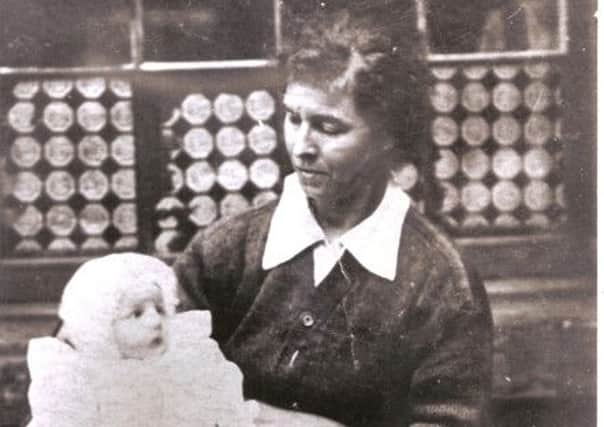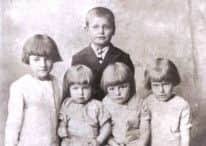Nostalgia with Margaret Watson: Strong-minded spinster Ruddle Rhoda was a genuine character


One such lady, who people still talk about, was “Ruddle Rhoda”, a strong and determined spinster lady, who supported herself by digging out scouring stones from the quarries in Caulms Wood and then selling them from a basket she carried on her shoulder.
Rhoda was born in the 1890s and grew up to be a woman with a proud spirit and a loving heart, a woman who cut her own path through life and relied on no-one but herself for her survival.
Advertisement
Hide AdAdvertisement
Hide AdShe was tall, walked straight and was very strong. She used to get up at the crack of dawn and, no matter what the weather, walked to Caulms Wood with her basket to dig out ruddle.


Rhoda was tall in stature and strong in character, and was a common sight walking through the streets of Dewsbury with head held high and her basket of scouring bricks on her shoulder, crying out in a powerful voice – “Ruddle for Sale!”
In those days women used to wash and scrub the flags outside their front door and then scour them with yellow ruddle to give them added colour.
They did this because they felt it was their responsibility to keep their part of the street as clean as possible, despite knowing that very quickly they would be dirty again.
Advertisement
Hide AdAdvertisement
Hide AdRhoda Johnson, who lived in Batley Carr, was one of the main suppliers of these ruddle stones which every woman in Dewsbury would almost certainly have stocked up on.
Rhoda never married, but she did “adopt” two children.
One was an orphan whom she brought out of the workhouse and the other was a baby born to her younger sister, Mary, who died during childbirth, which she called Rhoda..
Rhoda also helped her sister’s husband, Thomas Phillips, look after his remaining six children – Patience, Mary, Betty, Hilda, Tom and John – to allow him to continue his work at Joshua Ellis’ mill in Batley Carr.
This was at a time when women regularly died in childbirth and when there was no welfare state, no family allowance and little financial help in times of hardship.
Advertisement
Hide AdAdvertisement
Hide AdBefore taking the children under her wing, Rhoda had lived alone in a tiny one-roomed cellar kitchen in Milton Street, Batley Carr, then known as the Irish Fold because of the large number of immigrants living there.
After her sister’s death, she moved into a one-up-one-down cottage just further down the road from her brother-in-law and his children. Many years ago, I interviewed one of those children, Mrs Mary Caine, and she kindly told me more about her aunt’s life, which I recount today.
Mary was only three years old when her mother died, but she remembered Aunt Rhoda taking the new baby to live with her because her father couldn’t bring them all up on his own and also go out to work every day.
She recalled how her aunt had very little furniture, but what she did have was polished until it shone and her stone floors were scrubbed clean and scoured. She was spotless.
Advertisement
Hide AdAdvertisement
Hide AdMary remembered her aunt returning from selling her ruddle and then immediately changing her coarse apron for a freshly laundered white one, and start cooking and baking.
In her younger days, Rhoda had been a talented singer and dancer appearing at various theatres in the district, including Dewsbury Empire, but she gave it all up, suddenly and without explanation. No-one knew why she had done it, but her family always believed it had been to do with a man, an affair of the heart, perhaps, because after that she wouldn’t have anything to do with men.
Her niece recalled how she wouldn’t even have one inside the house, not for any reason, not even the insurance man, who she would keep at the door when he called for his money.
The second child whom Rhoda adopted was called Doris Cox, a little girl who had been placed in the workhouse after her mother died. These two children never wanted for anything while in Rhoda’s care, and people remember how she had loved and cared for them, literally working her finger to the bone for them.
Advertisement
Hide AdAdvertisement
Hide AdRhoda’s niece Mary remembered coming home from school and seeing her aunt in her white apron standing at the door with piles of thin cakes cooling outside on the windowsill.
She recalled: “Every Sunday she would invite one of us round for dinner and we always knew we’d get a really good meal, roast beef and Yorkshire pudding.
“The table during the week was covered with an oil cloth but at weekend she would bring out her best chenille cover which had tassels round the edge. She was a very proud woman who knew what the word duty meant.”
But over the years, Rhoda’s spartan life-style started to affect her health. Her fingers became gnarled with arthritis caused through years of digging out ruddle in all weathers.
Advertisement
Hide AdAdvertisement
Hide AdShe still insisted on doing all her washing in an old peggy tub, boiling, scrubbing and starching them, but when it came to winding the handle, she had to ask her young nieces down the road to do it for her. Rhoda’s brother, Walter Johnson, was also something of a local character, going round the streets with a horse and cart selling pots and pans and hardware.
Rhoda died in the 1950s, aged 65; Doris Cox, died a few years later, and the young Rhoda died in 1982.